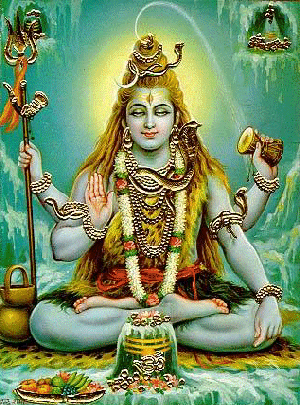The Fanatical Worshiper of ShivaFrom a class on There is an old story of a man who was a worshipper of Shiva. There are sects in our country who worship God as Shiva, and others who worship Him as Vishnu. This man was a great worshipper of Shiva, and to that he added a tremendous hatred for all worshippers of Vishnu, and would not hear the name of Vishnu pronounced. There are a great number of worshippers of Vishnu in India, and he could not avoid hearing the name. So he bored two holes in his ears, and tied two little bells on to them, and whenever a man mentioned the name of Vishnu, he moved his head, and rang the bells and that prevented his hearing the noise. But Shiva told him in a dream, "What a fool you are! I am Vishnu, and I am Shiva; they are not different, only in name; there are not two Gods". But this man said, "I don't care I will have nothing to do with this Vishnu business". He had a little statue of Shiva, and made it very nice, built an altar for it. One day he bought some beautiful incense and went home to light some of the incense for his God. While the fumes of his incense were rising in the air he found that the image was divided into two : one half remained Shiva, and the other half was Vishnu. Then the man jumped up and put his finger under the nostril of Vishnu so that not a particle of the smell could get there. Then Shiva became disgusted, and the man became a demon. He is the father of all fanatics, the "bell-eared" demon. He is respected by the boys of India, and they worship him. It is a very peculiar kind of worship. They make a clay image, and worship him with all sorts of horrible smelling flowers. There are some flowers in the forests in India which have a most pestilential smell. They worship him with these, and then take big sticks and beat the image. He is the father of all fanatics, who hate all other gods except their own. This is the only danger in this Nishta Bhakti, becoming this fanatical demon. The world gets full of them. It is very easy to hate; the generality of mankind get so weak that in order to love one they must hate another; they must take the energy out of one point in order to put it into another. A man loves one woman, and then loves another, and to love the other, he has to hate the first. So with women. This characteristic is in every part of our nature, and so in our religion. The ordinary, undeveloped weak brain of mankind cannot love one without hating another. This very [characteristic] becomes fanaticism in religion. Loving their own ideal is synonymous with hating every other idea. This should be avoided, and at the same time the other danger should be avoided. We must not fritter away all our energies. Religion becomes a nothing with us; just hearing lectures. These are the two dangers.
|
- www.vivekananda.net edited by Frank Parlato Jr.
